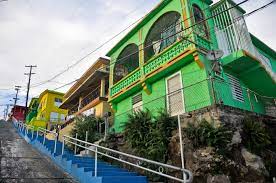Puerto Rico
Interesting blend of American, Spanish and Caribbean cultures, the archipelago of Puerto Rico is a delightful place to visit. If Puerto Rico has definitely the paradise white sand palm-fringed beaches and the crystal clear waters usually characterizing the Caribbean, the traveler exploring the interior of the islands will find sublime untouched jungles and stunning mountainous landscapes. Former Spanish colony, Puerto Rico is today part of the United States. If the highways and skyscrapers betray its American side, the soul of the archipelago remains definitely Spanish, with its colonial fortresses, pastel colored houses, love for fiesta and deep devotion to religion.
WHAT VACCINES DO I NEED FOR PUERTO RICO In 2026
The Government of Canada and the CDC recommend the following vaccines for travelling to Puerto Rico In 2026: Traveler’s Diarrhea, Hepatitis A, Hepatitis B, Rabies, Flu, COVID-19, Typhoid fever, Yellow Fever, Polio.
HEALTH INFORMATION
Risk of Zika in this Country. Learn More >>
We make every effort to ensure that the information posted on our website is up to date and accurate according to the latest public health recommendations; however, it is impossible for us to make changes on a daily basis.
For the most current travel health recommendations, please call our clinic as make an appointment with one of our travel health professionals.
PUERTO RICO – RECOMMENDED VACCINES
| Hepatitis A | Recommended for all travelers. |
| Tetanus – Diphteria – Pertussis Vaccine | Tetanus: In exceptional circumstances (eg, stay in a region where access to health care is limited), for a person aged 18 years or older, 1 dose of DT may be given if 5 years or more has elapsed since the last dose. Otherwise, one booster dose at the age of 50*. Pertussis (Whooping Cough): 1 dose is recommended for pregnant women, for every pregnancy, regardless of immunization history and the interval since the last dose (betwen week 26 and 32). *Only applicable for Quebec. |
| Measles – Rubella – Mumps | Two doses recommended for all travelers born after 1970, if not previously given. |
| Flu – Influenza | Seasonal influenza occurs worldwide. The flu season usually runs from November to April in the northern hemisphere, between April and October in the southern hemisphere and year round in the tropics. Influenza (flu) is caused by a virus spread from person to person through coughing and sneezing or by touching infected surfaces. Everyone 6 months and older should get a flu vaccine yearly. Vaccine is recommended 14 days prior to departure. |
| Routine vaccines (dCaT, Polio, Meningococcal, Shingles, Pneumococcal, Hepatitis B, HPV, MMR & Varicella) | Recommended for all travelers |
| Causes, Symptoms & Treatment – Typhoid fever | Recommended for most travelers, especially those who are staying with friends or relatives; visiting smaller cities, villages, or rural areas where exposure might occur through food or water; or prone to “adventurous eating” |
| Hepatitis B | Consider for most travelers; recommended for those who might be exposed to blood or other body fluids, have sexual contact with the local population, or be exposed through medical treatment (e.g., for an accident). |
| African Tick Bite Fever | Could be present. All travellers should protect themselves against tick bites. |
| Transmission, Symptoms and Prevention – Rabies | For travelers at high risk of animal bites or being involved in activities with bats, dogs and other mammals. Clients who plan to visit remote areas may consider receiving this vaccine. Important to note the pre-exposure rabies vaccine is administered in 2 doses with one week interval between doses. Post-exposure vaccination is always recommended, even for those previously vaccinated. |
| Turista – Traveler’s Diarrhea (ETEC) | Talk to your health care professional about the risks and precautionary measures to take, as well as the Dukoral® vaccine. Important to note that the Dukoral vaccine is an oral vaccine given in 2 doses, recommended at least 2 weeks prior to departure. |
| Dengue Fever, Chikungunya and/or Zika | There are many illnesses that are transmitted via mosquito bites and unfortunately we do not have vaccines to protect us against most of them. It is important to inquire with your healthcare professional regarding the specific risks and the different illnesses presently in circulation. |
RECOMMENDED MEDICATIONS
| Antibiotics Traveler’s Diarrhea | Ciprofloxacin, Azithromycin or Suprax. |
MEDICAL CARE
Puerto Rico has an adequate health care system. If you require medical care on the island, you can go to the Hospital Belle Vista, located in Mayaguez. The Yauca Hospital is another good address. These establishments are well equipped and offer quality care. But be aware that the cost of medical care can be expensive in Puerto Rico. In the event of serious health issues, an air evacuation is needed.
In case of emergency in Puerto Rico, call 911. Ambulance services are fast and paramedics are well trained.
Basic medicines are easily accessible in Puerto Rico. But it is always safer to bring your own drugs and potential specific treatments with you.
SECURITY ABROAD
Take normal safety precautions due to violent crime. Petty crime and robberies are prevalent.
CANADIAN EMBASSY
Emergency services
Dial 911 for emergency assistance.
